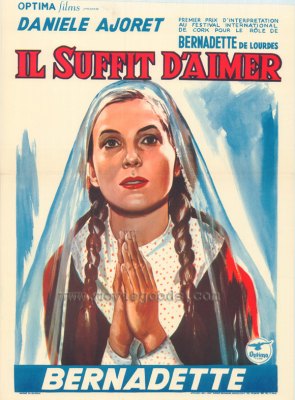| Reviews & Columns |
|
Reviews DVD TV on DVD Blu-ray 4K UHD International DVDs In Theaters Reviews by Studio Video Games Features Collector Series DVDs Easter Egg Database Interviews DVD Talk Radio Feature Articles Columns Anime Talk DVD Savant Horror DVDs The M.O.D. Squad Art House HD Talk Silent DVD
|
DVD Talk Forum |
|
|
| Resources |
|
DVD Price Search Customer Service #'s RCE Info Links |
|
Columns
|
|
|
Bernadette of Lourdes
The 93-and-a-half-minute film (not 97 minutes, as listed on the box) cuts to the chase; halfway through the first reel 14-year-old illiterate farm girl Bernadette (Daniele Ajoret) is out collecting firewood at the grotto of Massabielle outside Lourdes when she experiences the first of 18 visions, of a "small" and "beautiful young lady" wearing a white veil and blue belt (or girdle) with a golden rose on each foot. The vision does not identify itself but asks Bernadette to return to the grotto for the next 15 days.
The townsfolk, government and church officials soon learn of Bernadette's visions, some believing that she's faking in order to bring money and fame to her pitifully poor family, while others believe Bernadette's visions to be genuine. Eventually, the church accepts Bernadette's claims after parish Father Dominque Peyramale presses her to ask the vision her name. Following the sixteenth vision, Bernadette reports that the vision said, "I am the Immaculate Conception," a recent term in 1858 that in all likelihood would have been unknown to peasant girl Bernadette. Further, water from the spring dug by Bernadette, supposedly at the Virgin Mary's command, is said to have "inexplicable" curative powers.
In its favor Bernadette of Lourdes' approach is more poetic and less thuddingly literal than The Song of Bernadette (1943), which cast an uncredited Linda Darnell as the onscreen Virgin Mary. Here, as in the much-underrated The Miracle of Our Lady of Fatima (1952), likely a stylistic inspiration for this production, the Virgin Mary is neither seen nor heard but merely suggested. Ajoret, whose angelic features are just right for the film, despite bearing little resemblance to the real Bernadette, gets that faraway look in her eyes as her surroundings become both over-lit and filtery. It's not nearly as well executed as the compelling, ambiguous visions in Fatima but conceptually they're identical and not ineffective.
Similarly, no other miracles are shown, partly to maintain that ambiguity but probably also because this was made on a tight budget. In one scene we're told 20,000 spectators came to witness Bernadette's last visit to the grotto but don't get to see it. Indeed, the film goes overboard in this respect, with too many scenes of people standing around talking about things that have happened rather than showing them. Director Robert Darene clearly loves the zoom lens, which gets a workout almost worthy of Jess Franco or, more accurately, late-period Bava. The score by Maurice Thiriet (Children of Paradise) is effective during the vision scenes, but awful the rest of the time, gratingly bouncy and light, like something one would expect on an episode of "Lassie." All that zooming and the inapt score work against an otherwise intelligent if unexceptional approach.
This reviewer doesn't object to English dubbing if the film in question was shot with its European cast speaking their lines in English, phonetically or otherwise (a common production method in the 1960s and '70s), particularly in cases of multi-national productions with casts from all over the continent (e.g., Italy, France, Germany, Spain). That's not the case here: the cast seems entirely French and while the dubbing (which sounds like a Titra job) isn't bad, the subtlety of the performances is all but lost. Several of the voice actors will be familiar to fans of peplum and Spaghetti Westerns, and too many of the young girls sound alike. (Bernadette's mother is even voiced by a woman with a slight Brooklynese accent, not a good idea.)
Video & Audio
Bernadette of Lourdes is presented in a 1.78:1 16:9 enhanced transfer that approximates the original 1.66:1 theatrical aspect ratio. A copyright notice gets cropped off the (English-language, U.S. release version) titles, but mostly this compromised ratio doesn't adversely affect the compositions. Incidentally, the film's original distributor in the U.S. was none other than Janus Films, though presumably now that version is in the public domain, hence VCI's release.
The larger issue is that the image has a few noticeable splices and other damage, and both the print sourced and the transfer have resulted in a soft, slightly murky image. There's not much artifacting, but given all the outdoor scenes with their branches, leaves, burbling brooks and the like, it should be a lot sharper and less hard on the eyes. The English mono audio is adequate; there are no subtitle or alternate audio options.
Extra Features
The limited supplements include strange ads, not really trailers, for the 1955 and 1991 versions of The Miracle of Marcelino. Text features The Prayer of Bernadette and Making Bernadette a Saint read like they were cribbed from Internet sources. "The 67 cures at Lourdes recognized as miracles by the Church" is listed on the box but this reviewer couldn't find it on the DVD.
Parting Thoughts
Bernadette of Lourdes is more a curiosity than anything else. The muddy monochrome presentation and English dubbing will turn off mainstream Catholics interested in the story, while for film fans there's not much here, though the picture is moderately involving and the story compelling whether you accept it or not. If, like this reviewer, you're attracted to off-the-beaten-path obscurities like this, than Bernadette of Lourdes is modestly recommended but most will want to Rent It first.
Film historian Stuart Galbraith IV's latest books, Japanese Cinema and The Toho Studios Story, are now available for pre-order.
|
| Popular Reviews |
| Sponsored Links |
|
|
| Sponsored Links |
|
|
| Release List | Reviews | Shop | Newsletter | Forum | DVD Giveaways | Blu-Ray | Advertise |
|
Copyright 2024 DVDTalk.com All Rights Reserved. Legal Info, Privacy Policy, Terms of Use,
Manage Preferences,
Your Privacy Choices | |||||||















